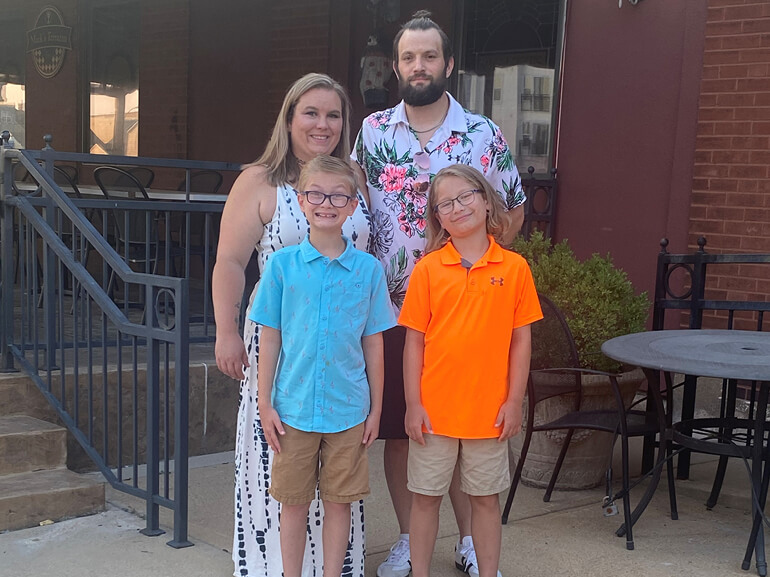Deidra's story

After the death of her grandfather, 36-year-old Deidra McLaughlin traveled from her home in Creve Coeur, Missouri to Pennsylvania for his funeral. When it was time to return home, Deidra began to feel dreadfully nauseous. Unable to drive, Deidra called her uncle, who helped make sure she arrived at the airport in time.
On the second leg of her flight to St. Louis, Deidra fell asleep. While she was sleeping on the plane, Deidra suffered a stroke. Fortunately, there was a nurse on the flight who helped Deidra contact her mother, who was picking her up at the airport. The nurse worked with flight staff to arrange for an ambulance to meet the plane as soon as it landed.
Deidra was rushed to SSM Health DePaul Hospital where a CT scan found a brain bleed. She underwent an emergency craniectomy, which is a surgery where a portion of the skull is removed to help relieve extra pressure on the brain. Deidra was put on a ventilator to assist her in breathing as her body healed. She would spend the next month in the hospital recovering before she was medically stable enough to begin an intensive rehabilitation program at SSM Health Rehabilitation Hospital – Bridgeton.
Upon arrival at Bridgeton, Deidra was unable to use the left side of her body or walk due to hemiparesis, or muscle weakness affecting one side of the body. She was experiencing severe pain in her left shoulder and required maximum assistance for nearly all of her personal care activities. Deidra was also suffering from left neglect, which can happen when a person who suffers a stroke has difficulty processing what they are seeing. This can lead to visual neglect, or a lost sense of awareness for actions happening on one side of an individual. Deidra was also struggling with her executive functioning, such as planning, focusing attention, remembering and juggling multiple tasks. Indeed, Deidra required a lot of assistance to complete a task accurately.
Deidra’s goals at Bridgeton were to walk, go up and down stairs and use the left side of her body again. Before her stroke, Deidra lived an active life as a wife, mother of two young sons and a special education teacher; she wanted to be able to return to her life with as much independence as possible. Deidra’s physician-led team of nurses and physical, occupational and speech therapists devised a care plan to help her achieve her goals.
Deidra’s hemiparesis was so severe that attempting to walk was initially unsafe, so physical therapists focused on helping her transfer from her bed to a chair. Because Deidra’s left knee was particularly unstable, putting her at an increased risk for falls, physical therapists provided a knee brace to provide additional support and prevent buckling. She stated that getting the knee brace was a major “ah-ha!” moment in her recovery as it helped her trust her body knowing that her knee would not buckle.
Physical therapists also supplied Deidra with an ankle-foot orthosis, which served to stabilize and support her left ankle as she began walking with support. “Working with Deidra has been a joy,” one of her physical therapists said. “Her determination and willingness to try new things was inspiring to witness.”
Deidra and her occupational therapists worked diligently to help her become more independent in her personal care. Initially, she required total assistance for all tasks except brushing her teeth and feeding herself, which she could do with some help. Deidra’s team fitted her with a shoulder brace to help her maintain proper positioning of her shoulder to decrease her pain. As her shoulder pain subsided, she was able to participate more actively in her therapy sessions. To address Deidra’s visual neglect on her left side, occupational therapists consulted with a neuro-optometrist to utilize prism therapy, which can help improve depth and spatial perception. The use of prism lenses along with customized exercises improves visual processing by retraining the brain and eyes to work together. Therapists also utilized electrical stimulation to Deidra’s left arm and hand to promote movement and provided special equipment to help her more easily complete her activities of daily living, such as bathing, dressing and cooking.
Speech therapists focused on helping Deidra improve her cognition, functional memory, complex reasoning and visual attention skills. Her therapy sessions included conversation exercises and logic puzzles and utilized technology, including different apps on an iPad. “Deidra was always willing to participate in cognitive therapy tasks,” her speech therapist noted. “No matter how difficult the task was, she kept going. I was impressed with Deidra’s ability to persevere through difficult situations with determination, patience and humor.”
SSM Health Rehabilitation Hospital – Bridgeton’s facility dog, Duo Dog Kia, played an essential role in Deidra’s healing process. "I love Kia. He’s my buddy. I played games with him," she said. Her family’s emotional support also helped Deidra stay positive and focus on her goals. Deidra also noted that being around other people who have experienced what she had was helpful and motivating.
After 29 days at Bridgeton, Deidra made significant strides in her recovery. Her shoulder pain had improved significantly, and she was able to walk up to 36 feet with the assistance of one person using a cane and her left ankle-foot orthosis. She could dress herself and complete transfers with supervision. She needed only minimal cues to complete executive functioning tasks and had made great progress with her memory and attention.
Describing her rehabilitation experience as "exhausting, but worth it,” Deidra said she was looking forward to being home with her family, sleeping in her own bed and seeing her pets. When asked if she learned anything about herself during her recovery, she stated, “I learned that I can work through the pain and that I am stronger than I thought.”
Deidra offers the following advice to others facing a difficult recovery: “Trust your body. It takes a while for everything to get back to working correctly.